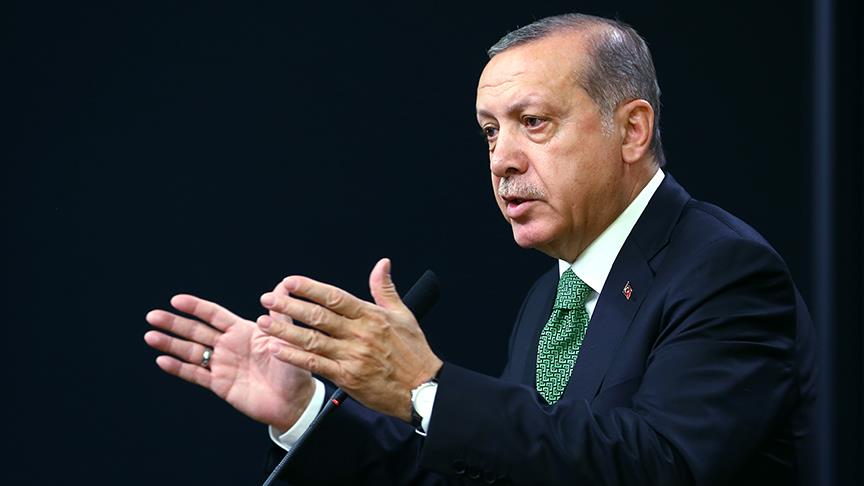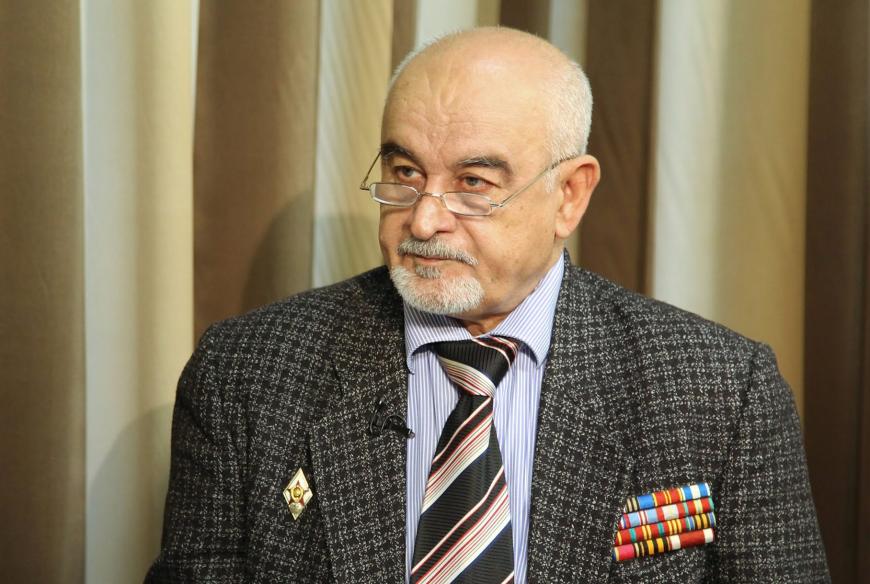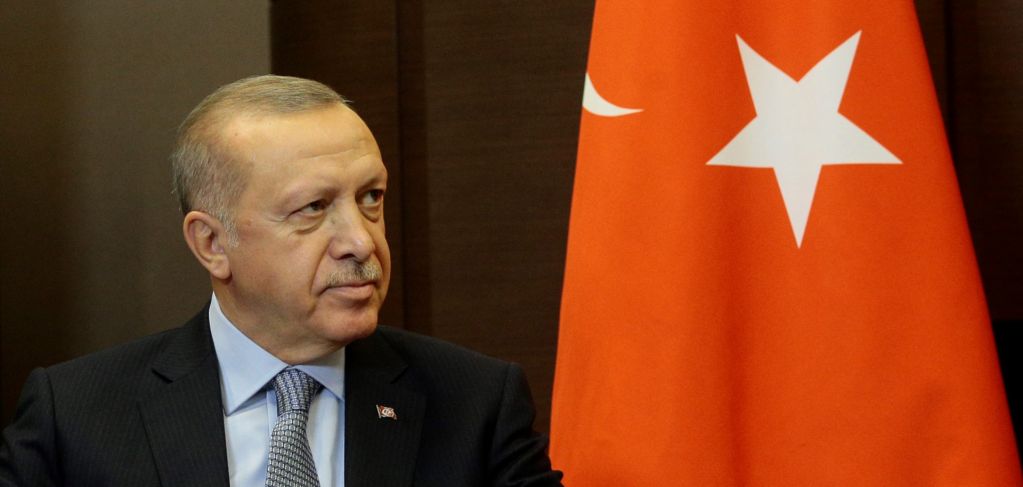

Turkish President Recep Tayyip Erdogan (L) and U.S. President Donald Trump hold a news conference at the White House on Nov. 13, 2019. Other than Trump, Erdogan appears to have few friends left in Washington.
- Despite some worries otherwise, Turkish President Recep Tayyip Erdogan’s visit to Washington was largely free of drama, but it also didn’t achieve any breakthroughs toward resolving long-standing bilateral disputes.
- U.S. President Donald Trump essentially has given Turkey a chance to reconsider its position on buying S-400 missile defense systems from Russia, dangling the possibility of readmittance into the F-35 program as a lure.
- Satisfying Washington will be tough, as doing so would likely anger Russia, which could retaliate by imposing measures on Turkey that could prove damaging to the interests of both Erdogan and his country.
Turkish President Recep Tayyip Erdogan’s White House visit on Nov. 13 can be regarded as a win for Erdogan only in a narrow, yet significant sense. Amid the threat of looming U.S. sanctions, Erdogan’s meeting with U.S. President Donald Trump ended with the Turkish president voicing Ankara’s demands in the Oval office and, apparently, managing to stave off punitive U.S. measures.
To be clear, Erdogan’s visit resolved none of the long-standing bilateral disputes between the United States and Turkey, and Erdogan — who is viewed with contempt by nearly all U.S. federal agencies — would not have been welcome in Washington had it not been for Trump’s personal invitation. Turkey, after all, has few friends left in the U.S. capital after its recent incursion into northern Syria to attack the U.S.-backed Kurdish military forces that have been fighting the Islamic State and its purchase of Russian S-400 missile defense systems, which many see as a violation of its NATO commitments.
Conversely, it is unclear what Trump gained from giving numerous photo opportunities to a leader whom American governmental institutions widely regard as an unreliable partner at best, as well as an authoritarian leader who is visibly cozying up to Russia at the expense of the Western alliance’s interests. Most observers of Turkey have reached the conclusion that the alliance between Turkey and the United States exists in name only and definitely not in substance. There is ample reason to believe that Turkey and the United States will continue to drift further apart without more substantive engagement on the issues that divide the beleaguered allies.
Erdogan arrived in Washington with a long list of requests, most of which seemed aimed at preserving himself and his government. Worries that the United States was going to disclose some of the more questionable sources of Erdogan’s vast personal wealth and the future of Turkey’s Halkbank apparently topped the list. Last month, U.S. prosecutors in the southern district of New York charged state-owned Halkbank with violating U.S. sanctions on Iran.
Erdogan arrived in Washington with a long list of requests, most of which seemed aimed at preserving himself and his government.
Additionally, Erdogan angered administration officials and a group of U.S. senators who attended his Oval Office meeting with Trump when he showed a video on an iPad depicting the leader of the Kurdish-led Syrian Democratic Forces, Mazloum Abdi, as a terrorist who should be apprehended and handed over to Turkey rather than invited to visit Washington. When U.S. Sen. Lindsay Graham brushed aside this act of propaganda, the focus of the discussion moved to Turkey’s purchase of Russian S-400 missile defense systems. From the joint statement that followed Trump’s meeting with Erdogan, it is clear the United States was interested in driving home one key ask of Turkey: Find a verifiable way to shelve the S-400s and, in return, rejoin the F-35 fighter jet program. If not, expect severe and debilitating sanctions.
Stuck Between a Rock and a Hard Place
On the S-400 issue, Erdogan faces an interesting conundrum and one of the most consequential decisions he will make. More than just losing face, Turkey would find it difficult to nullify its purchase of the S-400s. From past experience, Erdogan is keenly aware that angering Russian President Vladimir Putin is a sensitive issue, and there are credible reports suggesting Putin could release a trove of embarrassing and compromising materials that would showcase Erdogan and his family’s questionable financial dealings and international connections. Putin also could punish Turkey economically by terminating existing trade and tourism agreements vital to the health of Turkey’s economy.
On the flip side, failing to satisfy Washington on the S-400 issue could unleash a barrage of sanctions. For the time being, the United States appears to have given Turkey an opportunity to think hard about the issue and act appropriately. As it stands, the U.S. case against Halkbank and a proposed resolution in the U.S. Senate to recognize the killing of Armenians by Ottoman Turks as genocide (the U.S. House of Representatives overwhelmingly passed a similar resolution last month) have both been put on ice as a gesture of goodwill and a signal that the United States is serious in its interest to bring Turkey back into the Western fold. As aggressive and credible as the U.S. position may be, some American officials worry that pushing Turkey too hard and punishing it with sanctions will drive it deeper into the open arms of Russia. Although Turkey has few friends in the U.S. Defense and State departments, no one is interested in Turkey formally pledging itself to the Russian camp.
A Fatigued and Insecure Ruler
It appears from observing Erdogan that hubris increasingly masks a lack of confidence, while insecurity shadows and undergirds his 17-year rule. Shortly before his scheduled visit to Washington, Erdogan gave a 36-minute speech on the 81st anniversary of the death of Mustafa Kemal Ataturk, the founder of the modern Turkish Republic. He underplayed the achievements of the republic to focus instead on a series of inaccurate observations that modern-day Turkey’s successes basically lay in the heritage of its predecessor, the Ottoman Empire. Lack of historical knowledge and nuance aside, it apparently was lost on Erdogan that the Ottoman state would never have allowed someone with a common background like his to occupy an influential government position, let alone become head of state.
Erdogan should not be underestimated, however. He is a master tactician, with the ability and will to change the public discourse and political climate to his advantage on a whim. Over the past six years or so, he has mobilized such prowess solely for his self-preservation. It remains to be seen if he can use his powers and influence in the service of his country’s national interests.



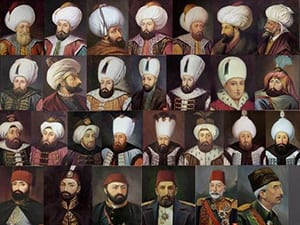
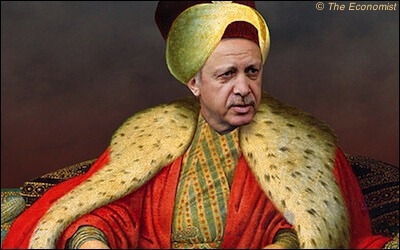
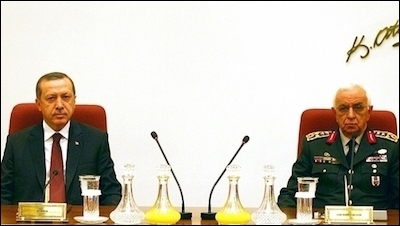 At a dramatic meeting on July 29, 2011, Turkey’s army chief-of-staff and the entire military command resigned, giving Erdoğan control over the armed forces.
At a dramatic meeting on July 29, 2011, Turkey’s army chief-of-staff and the entire military command resigned, giving Erdoğan control over the armed forces.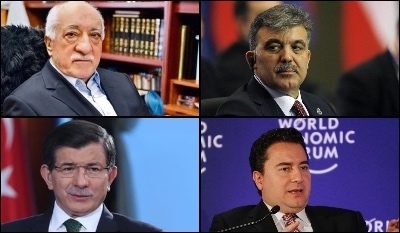 Early Erdoğan allies (clockwise from top left) Fethullah Gülen, Abdullah Gül, Ali Babacan, and Ahmet Davutoğlu are now staunch foes.
Early Erdoğan allies (clockwise from top left) Fethullah Gülen, Abdullah Gül, Ali Babacan, and Ahmet Davutoğlu are now staunch foes. Turkish Airlines raises its profile by associating with the likes of FC Barcelona.
Turkish Airlines raises its profile by associating with the likes of FC Barcelona.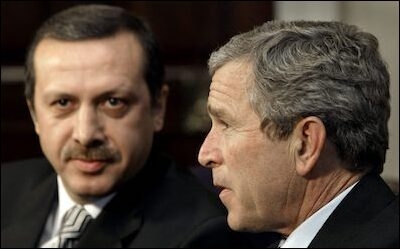 In an unusual development, President George W. Bush invited Erdoğan in December 2002 when he was only AKP chairman, paving the way for him to become prime minister.
In an unusual development, President George W. Bush invited Erdoğan in December 2002 when he was only AKP chairman, paving the way for him to become prime minister.
